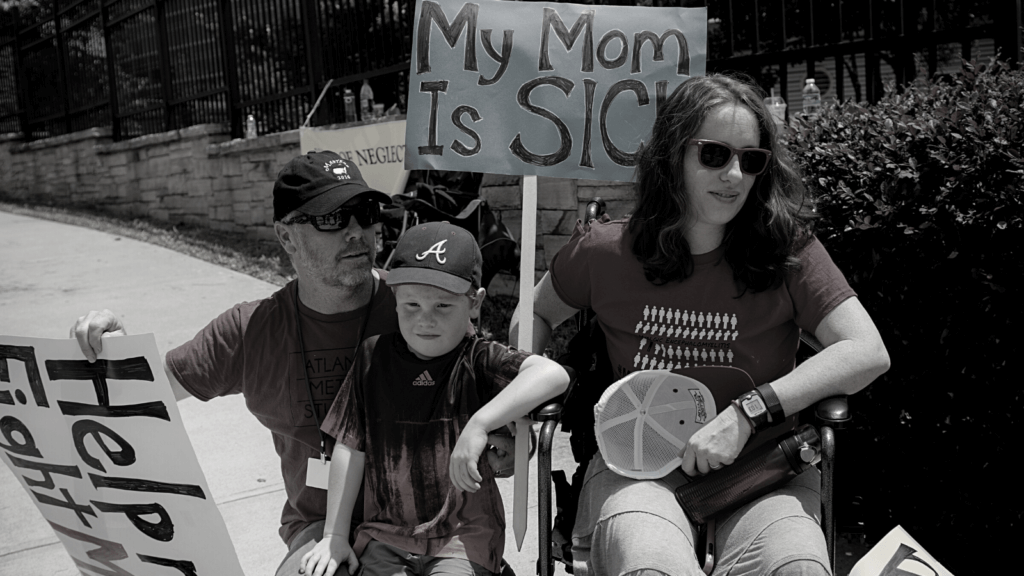The U.S. Centers for Disease Control and Prevention (CDC) has published interim guidance for evaluating and caring for patients with post-COVID conditions.* The CDC will present this guidance to clinicians on a public COCA Call on Thursday, June 17th from 2:00 PM – 3:00 PM ET. This guidance deserves a detailed review of what has been included or left-out and where additional revisions may be needed, but their recognition of ME/CFS and PEM is crucial. What I offer below are four advocacy takeaways that put this post-COVID interim guidance in context for the ME community.
1. ME/CFS is in included in the guidance
The guidance does reference myalgic encephalomyelitis/chronic fatigue syndrome (ME/CFS) in multiple places along with postural orthostatic tachycardia syndrome (POTS) and mast cell activation syndrome (MCAS). Post-exertional malaise (PEM) is both listed as a symptom and described in plain-english. The interim guidance includes links to the CDC’s web pages on ME/CFS treatment and preventing PEM. Specific cautions are made to clinicians about patients with PEM when the guidance discusses exercise testing and rehabilitation plans. There are also omissions. The sections on patient history and physical exam and assessment and testing are missing any reference to diagnosis or testing for ME/CFS, whereas POTS is included, but at least these pages both clearly reference the symptom of PEM and link back to the ME/CFS pages for more information.
2. Long COVID patient input is making a difference
Long COVID groups like Body Politic and Patient-Led Research Collaborative gave essential, ME/CFS-informed input to CDC’s Post-COVID Conditions Unit that made a real difference. The impact of patient advocacy on this guidance really comes through in the following quotes:
“Overall, it is important for healthcare professionals to listen to and validate patients’ experiences, recognizing that diagnostic testing results may be within normal ranges even for patients whose symptoms and conditions negatively impact their quality of life, functioning (e.g., with activities of daily living), and ability to return to school or work.”
General Clinical Considerations, CDC
“Lastly, patient advocacy groups have raised concerns that some post-COVID conditions have been either misdiagnosed as or misattributed to psychiatric causes, particularly among persons who belong to marginalized or vulnerable groups. Sensitivity to and awareness of stigma, completing a full clinical evaluation, and maintaining an attitude of empathy and understanding can help address these concerns.”
Patient Groups with Special Considerations, CDC
#MEAction wrote to the CDC earlier this month about our concerns for how ME/CFS is included in Long COVID patient materials. It is encouraging to see that many of the issues we raised were addressed, at least to some degree, in this interim clinical guidance. Also, Dr. Peter Rowe, ME/CFS clinician and researcher, is acknowledged as an external expert contributor to this interim guidance.
3. ME advocacy to CDC built a foundation for Long COVID
Another key reason why the acknowledgments of ME/CFS, PEM, and exercise intolerance made it into this post-COVID conditions interim guidance is because of ME advocates’ persistent efforts to get the CDC’s ME/CFS webpages revised, including the removal of cognitive behavioral therapy (CBT) and graded exercise therapy (GET) as treatment recommendations. Without all this work, the information Long COVID patients would have access to on dealing with symptoms, like post-exertional malaise, would be very different. You can read more about #MEAction’s efforts here and here.

4. ME/CFS guidelines depend on NIH & CDC clearing the path for clinical treatment trials
As good as some elements of this interim guidance are, it will only go so far in helping Long COVID patients. Aside from advising activity management (pacing) to avoid PEM, there is very little information on any treatments in this guidance. Irrespective of whatever this CDC interim guidance says, the medical community will make decisions about treatments based on evidence. The only way to achieve established treatment guidelines for ME/CFS is to perform clinical treatment trials. The CDC announced they are putting plans for ME/CFS treatment guidelines on hold until there is new clinical trial data to proceed upon. While it is good that ME/CFS treatment guidelines aren’t being developed from a flawed systematic evidence review, the lack of federal guidelines for people with ME is clearly a problem. This is why we continue to be so critical of CDC and NIH leadership for failing people with ME and are urging NIH to expedite clinical treatment trials of repurposed drugs used in treating ME/CFS. Only through funding large-scale clinical treatment trials will both Long COVID patients and people with ME get the help they deserve.
All in all, our advocacy matters, even when it takes a long time. We must keep up the fight. Join us for #MEAction’s town hall meeting on Wednesday, June 23rd regarding the CDC draft evidence review for ME/CFS treatments, which is deeply problematic. Read more about the CDC’s flawed evidence review here.
NOTE:
*In the CDC’s framework, post-COVID conditions is an umbrella term for three distinct types of long-term health problems resulting from COVID-19, which include Long COVID as well as effects from organ damage and hospitalization or treatment.






3 thoughts on “CDC releases post-COVID guidance: 4 takeaways for ME/CFS”
If you don’t get mandatory continuing medical education programs for myalgic encephalomyelitis and long haulers you will get no where.
If you don’t get the idea that you can exercise a debilitating disease away, you will go no where.
If you don’t get the CDC and NIH to stop sabotaging and diluting myalgic encephalomyelitis to a wastebasket diagnosis you will leave millions of people suffering with zero access to care 5 more decades .
You must clarify the importance of language & need for epidemiologists to have the correct
Ramsay definition so myalgic encephalomyelitis is no longer marginalized and sabotaged from biomedical R&D and correct care. neurological , Post-exertional neuroimmune exhaustion.
Stop the dilution.
You might want to re-read, delete and repost or edit if you can. Pretty sure you left an ‘t off the can in your 2nd point. While PWMEs will see this as a mistake, other’s won’t and may be confused.
MEAction, please be aggressive. There has been no real action in Washington for MECFS and we can not continue to let years and decades go by with no tests, treatments, and cures. The current strategies are not yielding results. Again, please be aggressive. Stop the inaction in Washington.
Comments are closed.